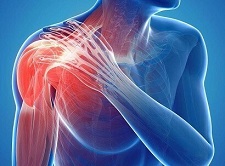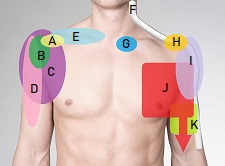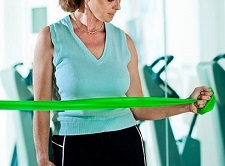- Home
- Diagnosis Guide
- Clicking Shoulder
Shoulder Clicking & Popping
Written By: Chloe Wilson BSc (Hons) Physiotherapy
Reviewed By: SPE Medical Review Board
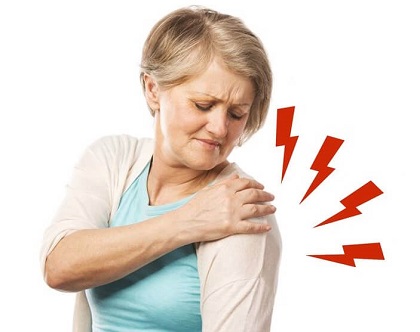
Shoulder clicking, popping, cracking or grinding is a common problem experienced by many people.
You might hear shoulder cracking when lifting weights, get shoulder popping when lifting your arm or have grinding, clicking shoulder blades anytime you roll your shoulders.
It might be completely painless but in many cases shoulder clicking and pain go hand in hand and can affect day to day life.
I’ve lost count of the number of times I’ve been asked “why does my shoulder click?” Well, there are lots of different reasons.
What Causes Shoulder Clicking?
Let’s start by looking at the most common causes of shoulder clicking, popping, cracking and grinding and how to tell which is which.
1. Scapulothoracic Bursitis
If you notice your shoulder blade grinding and popping, it’s most likely from scapulothoracic bursitis, aka snapping scapular syndrome. This is when there is inflammation of the bursa (fluid filled sacs) that sit between the shoulder blade and rib cage, affecting how the scapula moves. This results in friction, weakness, pain and a cracking noise or popping sound in the shoulder blade when you move your arm. LEARN MORE >
2. Labral Tear
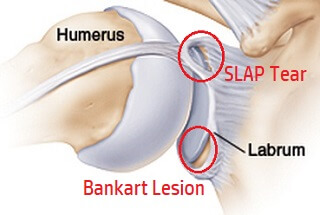
Shoulder pain and clicking may be due to a tear in the glenoid labrum, the ring of cartilage that runs around the edge of the shoulder socket and helps hold the joint in place.
A labrum tear is a common cause of shoulder popping after a fall, sports injury or shoulder dislocation. If you find yourself popping your shoulder in and out, get a catching sensation when moving your arm or hear clicking in your shoulder when raising your arm, it may be from a labrum tear.
A tear of the upper labrum is known as a SLAP tear while a tear in the bottom portion of the labrum is known as a Bankart lesion.
3. Osteochondroma
An osteochondroma is a benign (non-cancerous) bone growth on the shoulder, rib cage or shoulder blade that causes shoulder clicking, cracking or popping. You may notice a hard shoulder lump. In most cases of shoulder osetochondromas there is shoulder clicking but no pain, unless the growth is rubbing on a nearby tendon or nerve which can lead to pain, tingling and numbness.
4. Cavitation
Many cases of shoulder clicking without pain are simply from gas bubbles in the shoulder popping. Whilst cavitation is most common in the fingers, spine and knees, it can also occur in the shoulder. Changes in joint pressure can lead to the formation of gas bubbles which then burst when you move your arm resulting in shoulder popping but no pain.
5. Rotator Cuff Tear
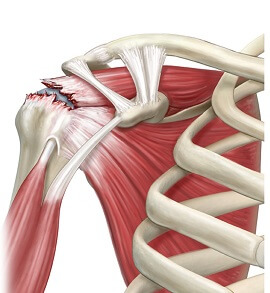
Another common cause of shoulder clicking and popping is a rotator cuff tear where there is damage to one of the muscles that controls and stabilises the shoulder joint.
In younger people there tends to be an acute tear from an injury such as a fall or heavy lifting whilst in older people there is usually a degenerative tear from repetitive wear and tear.
With rotator cuff tears there are often popping sounds in the shoulder when moving the arm and shoulder pain and clicking. The arm may feel weak and sleep is often affected. LEARN MORE >
6. Osteoarthritis
Shoulder grinding when rotating or lifting the arm is often caused by arthritis in people over the age of 60. As we get older, our joint cartilage thins and frays, reducing the cushioning between the bones which leads to friction. As arthritis progresses, you can get bone rubbing on bone which causes pain and grinding in the shoulder or shoulder cracking when rotating or raising the arm.
7. Swimmers Shoulder
If you are a swimmer experiencing shoulder clicking, chances are you have swimmers shoulder. There may or may not be any associated pain, but you may have noticed that your pace has decreased slightly or that you have have slightly changed your stroke technique to avoid pain.
The repetitive nature of swimming and the fact that the shoulder is working in it's most vulnerable position leads to instability and inflammation in the shoulder, which can cause shoulder clicking, pain and weakness. LEARN MORE >
8. ACJ Damage
Shoulder clicking around the collar bone is often due to a problem in the acromioclavicular joint, where the collar bone joins with the shoulder blade. In younger patients it tends to be due to a tear in the acromioclavicular ligament, in older patients it is usually due to arthritis in the ACJ. People often notice the shoulder bone popping up at the joint with the collar bone.
With ACJ damage there is usually shoulder pain and collar bone popping or clicking when moving the arm, particularly when bringing the arm across your body.
9. Shoulder Instability
Shoulder clicking is often caused by instability and weakness in the shoulder muscles. The shoulder joint sacrifices bony stability for joint mobility and relies heavily on support from the rotator cuff muscles and ligaments to hold it in place as it moves.
Weakness in the muscles, labrum tears, ligament injuries or hyperflexibility lead to excessive movement in the shoulder joint leading to shoulder pain and clicking or cracking. In some cases, people experience partial or full shoulder dislocations where the upper arm bone pops out of the shoulder joint.
Instability is the most common cause of shoulder clicking and pain in younger people and can usually be treated with strengthening exercises.
10. Biceps Instability
Front of shoulder popping is often caused by biceps instability. The long head of biceps tendon sits in a shallow groove on the front of the upper arm and is held in place by rotator cuff tendons and ligaments.
If these are damaged, then the biceps tendon can slip out of the groove causing a clicking or snapping sound in the shoulder/upper arm. In most cases of biceps instability there is shoulder clicking when rotating the arm rather than when lifting it or bending the elbow.
Other Causes Of Shoulder Popping
Some of the less common causes of shoulder clicking and popping include:
- Shoulder Impingement Syndrome: Where soft tissues are repeatedly squashed or trapped leading to inflammation and tearing. Shoulder impingement syndrome can develop suddenly from an injury, or gradually from wear and tear. Classic symptoms include a sharp pain in the shoulder which may extend down the arm that is worst when the arm is raised around shoulder height or twisted behind your back. It is often painful to lie on your side and there may be shoulder popping pain.
- Undisplaced Fracture: If you have a small fracture of one of the arm bones, you may notice some shoulder clicking or grinding when you move your arm from the broken ends of the bone rubbing against each other as they move slightly.
- Unhealed Fracture: If you broke one of the shoulder bones in the past, you may get intermittent shoulder clicking if it hasn’t healed properly. When a fracture heals, it lays down new bone to fill the gap and sometimes excess bone forms a small lump over the fracture site. These ridges can catch against other bones or soft tissues resulting in shoulder popping or clicking.
- Shoulder Dislocation: When the shoulder is pushed partly or fully out of the socket. There may be a loud popping noise in your shoulder at the time of injury and if there is ongoing instability you may find yourself popping your shoulder in and out intermittently.
Shoulder Pain & Popping Treatment
Treatment for shoulder clicking and grinding will depend on the underlying cause of the shoulder popping and may include:
- Shoulder Strengthening: Rotator cuff strengthening exercises to improve the strength, stability and control of the shoulder
- Scapular Strengthening: Scapular stabilization exercises to improve the positioning and control of the shoulder blade during shoulder movements
- Shoulder Stretches: arm stretches help to reduce any muscle tightness and improve shoulder mobility
- Posture Re-education: to improve shoulder positioning and mobility and upper back stretches
- Physical Therapy: rehab program, friction massage, ultrasound and taping/strapping
- Steroid Injection: Corticosteroid injection into the shoulder to relieve pain and inflammation
- Medication: Pain relief and/or anti-inflammatories
- Surgery: to remove excess bone spurs, repair torn ligaments or increase subacromial space
It’s important to get an accurate diagnosis but if you are looking for a quick shoulder popping fix, a good place to start is usually with rotator cuff exercises.
Why Does My Shoulder Click?
The best way to find out what is causing your shoulder clicking is to see your doctor. Common investigations for shoulder pain and popping or clicking include:
- Objective Tests: looking at shoulder position, movement, strength and various special tests e.g. Neer Test (impingement), Speed Test (biceps) Crank Test (labrum tear) Scarf Test (ACJ dysfunction)
- X-rays
- MRI: Magnetic Resonance Imaging
- Ultrasound
- CT Scan: Computerized Tomography
- Blood Tests
Common symptoms associated with shoulder clicking that can help your doctor work out what is wrong include:
- Shoulder Popping After Fall: fracture, dislocation, labrum tear, rotator cuff tear
- Shoulder Bone Popping Up: dislocation or subluxation, ACJ injury
- Front Of Shoulder Popping: rotator cuff tear, biceps impingement, labrum tear, swimmers shoulder
- Shoulder Blade Grinding & Popping: scapulothoracic bursitis, bone spur
- Shoulder Clicking No Pain: cavitation, osteochondroma, mild arthritis, bone spurs
- Shoulder Clicking And Pain: labrum tear, moderate to severe arthritis, ACJ injury, shoulder impingement, fracture, dislocation
- Shoulder Grinding When Rotating: biceps impingement, ACJ injury, arthritis, swimmers shoulder
- Popping Shoulder In & Out: labrum tear, dislocation, instability
- Shoulder Feels Like It’s Catching: labrum tear, dislocation, impingement syndrome
- Shoulder Clicking And Lump On Arm: fracture, osteochondroma, bursitis
- Shoulder Cracking When Lifting Weights: cavitation, rotator cuff tear, instability, labrum tear, impingement syndrome
What Else Can Help?
Here we have looked at the common causes of shoulder clicking, popping, catching and grinding and have started to look at how to treat popping sounds in the shoulder. In most cases shoulder grinding and clicking is nothing to worry about and will settle down with rest and simple home treatment. You can find out more about the causes, symptoms, diagnosis and treatment options for each by using the links above.
If you want to know more about how to fix shoulder popping, a great place to start is with exercises to improve shoulder strength, stability and mobility.
Hopefully this article has answered your question “why does my shoulder click?” But if you are still not sure what is causing your pain, visit the shoulder pain diagnosis section for loads of advice to help you work out what is wrong.
You may also be interested in the following articles
- Shoulder Pain At Night
- Shoulder Pain When Lifting The Arm
- Burning Shoulder Pain
- Sharp Shoulder Pain
- Arm Nerve Pain
- Shoulder Lumps & Bumps
Page Last Updated: 09/25/2023
Next Review Due: 09/25/2025
Related Articles
Shoulder Problems
November 6th, 2024
Diagnosis Charts
February 11th, 2025
Rehab Exercises
December 12, 2023
Medical & Scientific References
- Special Diagnostic Tests for Shoulder Pain: Very Well Health
- Painful Clicking, Snapping and Popping of the Shoulder: Shoulderdoc.co.uk
- The Painful Clicking, Popping and Catching Shoulder: Gobezie Shoulder Institute
